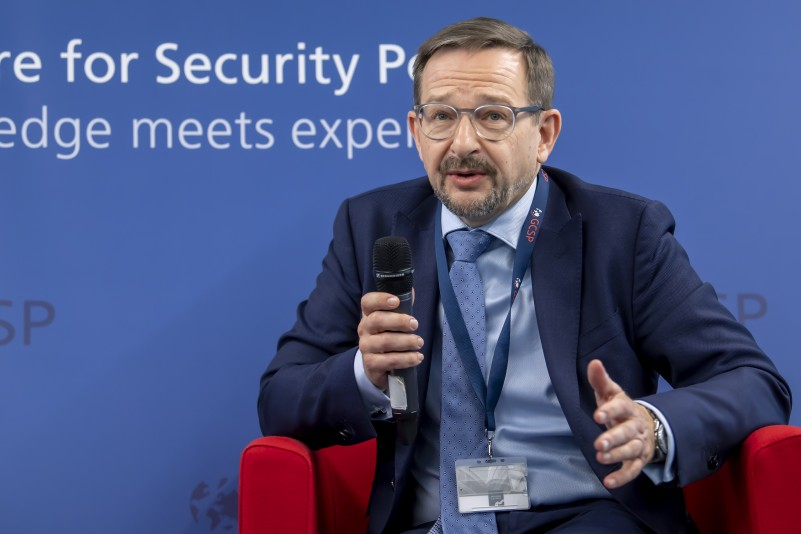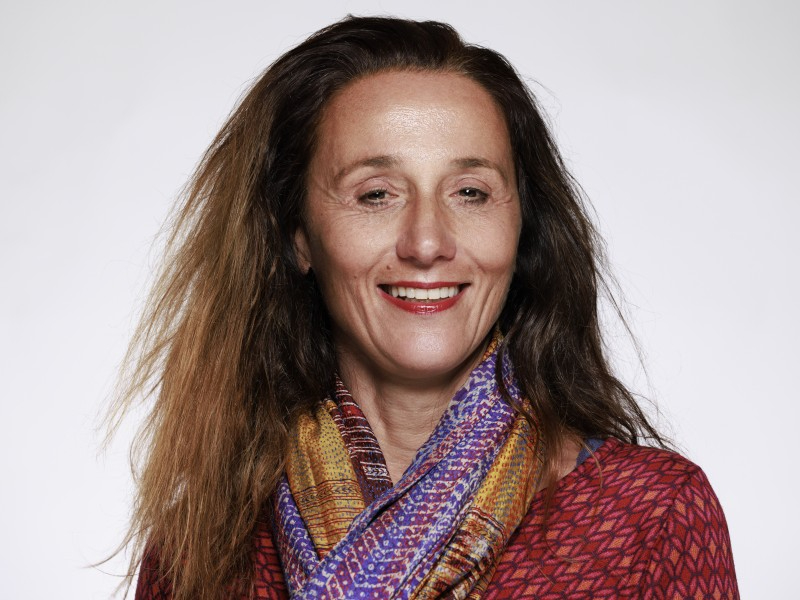Share post now
Article
"We do not want an endless war"
15.06.2023, International cooperation
There is little evidence of a move towards peace in the context of the war in Ukraine. Perhaps because no one knows what "making peace" would mean in this instance.... Interview with Thomas Greminger, Head of the Geneva Centre for Security Policy.

Ambassador Thomas Greminger during an event in Geneva in October 2021
© Martial Trezzini / KEYSTONE
At the organisation for Security and Cooperation in Europe (OSCE), Thomas Greminger played a key role in managing the crisis spawned by Russia's annexation of Crimea in 2014. Prior positions held included serving as Head of the Human Security Division of the Federal Department of Foreign Affairs (FDFA), and also as Head of the South Cooperation Department of the Swiss Agency for Development and Cooperation (SDC). Between 2017 and 2020, Thomas Greminger was Secretary-General of the OSCE. In international Geneva, he is a proven expert on peace in Ukraine.
Alliance Sud: You have been a powerful advocate of mediation and peace promotion in the OSCE framework, especially in Ukraine following Russia's annexation of Crimea. Isn't Russia's invasion of Ukraine in 2022 proof that those efforts have failed?
Thomas Greminger: In the years 2014 and 2015, we successfully averted the escalation of the crisis in Ukraine; but it has never been possible to eliminate the conflict between Russia and Ukraine and its underlying tensions between Russia and the West. The West has always insisted that NATO is a defence alliance with no interest in attacking anyone, and that many countries were keen to become members out of fear of Moscow. Yet the west has failed to recognize that Russia has harboured legitimate security concerns and an age-old feeling of being threatened by the West, and which has its roots in the age of Napoleon and in Hitler's Germany. While Putin has indeed exploited all this as a pretext for pursuing a revanchist agenda, Russia's security concerns should be treated as legitimate. Lastly, we must admit that no international organisation is in a position to prevent a superpower from going to war – not the UN, not the OSCE.
Is a peace agreement conceivable in the present circumstances? And if so, would that mean surrendering 20 per cent of Ukrainian territory to Russia?
Calls are now being heard for a Plan B. Plan A consists of supporting Ukraine on the battlefield, for as long as it is willing to fight. The dominant opinion at present is that we should await the outcome of the spring offensive for both sides, after which it may be possible to return to the bargaining table to work out a ceasefire and perhaps even a peace agreement. Owing to a range of problems, primarily issues of territory on which neither party is prepared to compromise, that would be a major challenge. It is most unlikely that either of the two positions will prevail, neither that of Ukraine, which wants to liberate all the areas occupied since 2014, nor that of Russia, which is keen to consolidate all the territory it has annexed. We have no wish to reward Putin by approving his redrawing of the map by military means, but nor do we want an endless war. The transitional solution would be the temporary cession of territory similar to what took place between East and West Germany after the Second World War, or between the two Koreas. What is at stake is therefore not the surrender of territory in the narrow sense of international law, but agreeing to a temporary cession, which could be renegotiated under a future Russian government.
What would happen next?
The second issue would be the security guarantees that would be given to Ukraine against future attacks by Russia, and whether the country joins NATO or declares itself a neutral State. The Ukrainian Government would like NATO membership in order so that the country would enjoy the guarantees available under Article 5 of the Washington treaty. It seems politically difficult, however, given the resistance from certain NATO members, and considering that Russia would find NATO membership for Ukraine unacceptable. Then there is the question of compensation in connection with the adjustment of sanctions, and the matter of war crimes. There are four sets of issues that would have to be negotiated in the framework of a peace agreement.
At present, both Heads of State are keen to prosecute the conflict on the battlefield. they have no interest in sitting at a negotiating table, as both believe in a military victory. Should either side develop a different viewpoint, this could change.
Switzerland's renowned good offices seem non-existent in this instance. Are they, and if so, do they need to be reinvented?
The warring parties are showing no interest in traditional arbitration and mediation. Turkey's offer of mediation is based on power interests; the country is playing its role as a regional power, and President Erdogan enjoys access to both Heads of State. That is not the type of mediation that Switzerland or Norway could offer, and even if Switzerland had not adopted sanctions, its services would not be called upon.
According to Russia, sanctions have placed us on the list of "unfriendly" countries; the Syrian Constitutional Committee can now no longer meet in Geneva. But international talks on Georgia are continuing in Geneva, with Russia's participation. The Russians are highly pragmatic, they come to Geneva if they have the feeling that there is something in it for them. This also applies to a whole range of informal dialogue platforms provided by the Geneva Centre for Security Policy (GCSP).
The West is finding it ever more difficult to understand Switzerland's neutrality. Is it still in step with the times?
It is true that our neutrality has come under attack especially from Western countries. But from the standpoint of international Geneva, neutrality is much appreciated by all other countries, including those in the Global South, and Western nations welcome the dialogue frameworks we provide for controversial topics such as the Arctic, Syria, and nuclear weapons. In a highly polarised world, even the West has an interest in neutral States that can provide space for dialogue and negotiations. Neutrality has by no means lost its raison d'être, despite the pressure being exerted on it.
Meanwhile, Switzerland has most unequivocally endorsed the western values of human rights, the rule of law and democracy. In that connection, Switzerland underlines the view that neutrality is not a matter of values. At the same time, it is gratifying that Switzerland has not joined the camp of those providing military support to Ukraine, a move that would undermine the impartiality of a country that is host to so many international organisations.
According to the Ukraine Support Tracker, compared to other countries, Switzerland is not doing much to help Ukraine. Should the country step up its involvement, and if so, how?
In terms of the overall sum of the support being given to Ukraine, Switzerland seems not to measure up particularly well in this ranking, as it also covers military aid (weapons, munitions), which is very costly. It is hardly surprising, therefore, that Switzerland ranks a mere 28th. Things look much better when refugee spending (17th place) is included.
This is an indication that over the near-to-medium term, Switzerland will be under pressure to offset the lack of military support in some other field. By way of burden-sharing, we could find ourselves forced to contribute substantially in other areas such as humanitarian aid and reconstruction in Ukraine. Switzerland will come under growing pressure to do more than is presently the case. There will also be greater pressure to make savings in other areas; many countries in the South are nonetheless suffering as a result of the war and it would be unwise to cut back development cooperation in other parts of the world. Beyond the realm of humanitarian aid, this would enable authoritarian countries like Russia and China to expand their influence in countries of the South.
Should Switzerland authorise the re-export of war materiel?
We would do better to concentrate on the things we do well, as described above! The re-export of weapons will never significantly impact the war in Ukraine. As a country guided by the rule of law, we are required to apply current law. If the Federal Act on War Materiel prohibits this, we cannot permit re-exportation – unless the law is amended. If there is the will to do so, then we can, but it takes time. As things stand, we are bound by current law.
Alliance Sud is calling for a global security policy to avoid future wars. What do you think of this?
In my career I have always stood up for development, peace and security, and constantly underlined the linkages between these fields. As a country whose economy is so internationally oriented, Switzerland is dependent on stable international relations. This also includes fragile States. The countries hardest hit by the consequences of warfare, food and energy insecurity, political unrest, inflation, etc., are fragile States. Economies with below-average development are more vulnerable to ethnic, social and international conflicts. Investment in cooperation reinforces the resilience of fragile States, and can reduce State failure and the potential for conflict, with the result that less people are forced to leave their homelands. Development policy is conflict prevention policy.
Interview: Isolda Agazzi
An independent, federally funded foundation
The Geneva Centre for Security Policy (GCSP) is an independent foundation comprising 53 countries and the Canton of Geneva. The foundation was set up by the Swiss Confederation, which funds 70 per cent of its budget. It is headed by Swiss career diplomats (like Thomas Greminger at present) on whom the Federal Council confers the title of ambassador in that role. It is therefore both international and Swiss in character, but depends on Switzerland's political and financial support, "although we do enjoy a high degree of independence that is respected by Berne", says Greminger. "We abide by the three principles of independence, impartiality and inclusiveness – and this latter principle in regard to gender, geography and political persuasion, as we bring together people with a range of opinions."
Since the outbreak of the war in Ukraine, the GCSP has maintained its unbiased and integrative training programme for leaders, in spirit and in practice. Courses are still being run with Russian and Ukrainian participants. The GCSP provides room for informal dialogue and tackles issues relating directly to the war, and indirectly to topics no longer being discussed at government level, such as the nuclear weapons dialogue between the USA and Russia.
